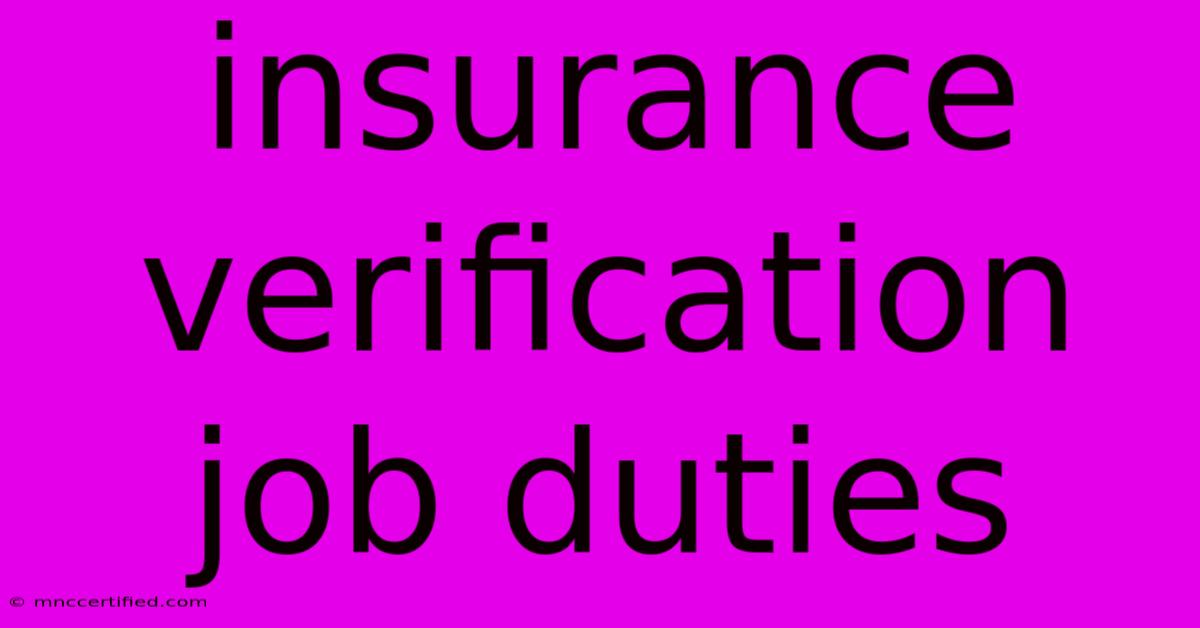Insurance Verification Job Duties

Table of Contents
Insurance Verification: Job Duties and How to Excel
Insurance verification is a critical role in healthcare, ensuring smooth patient care and timely reimbursements. This detailed guide explores the core job duties of an insurance verification specialist, highlighting essential skills and offering tips to excel in this demanding yet rewarding field. We'll cover everything from pre-registration to claim submission, making this your go-to resource for understanding this crucial position.
Core Job Duties of an Insurance Verification Specialist
The day-to-day responsibilities of an insurance verification specialist can vary depending on the healthcare setting (hospital, clinic, private practice), but several core duties remain consistent:
1. Pre-Registration and Patient Information Gathering:
- Verifying Patient Insurance Coverage: This is the cornerstone of the job. Specialists meticulously confirm the patient's insurance coverage, including the plan type (PPO, HMO, etc.), effective dates, eligibility, and benefits. This often involves contacting insurance providers directly.
- Collecting Accurate Patient Demographics: Gathering complete and accurate patient information – name, address, date of birth, Social Security number, and employer information – is essential for accurate billing and claim processing. Any discrepancies can significantly delay payments.
- Obtaining Authorizations and Pre-certifications: For certain procedures or treatments, prior authorization from the insurance company is mandatory. The specialist secures these authorizations, preventing claim denials later.
2. Insurance Plan Analysis and Benefit Investigation:
- Determining Coverage for Specific Services: This involves reviewing the patient's plan details to ascertain which services are covered, the percentage of coverage (copay, coinsurance), and any applicable deductibles or out-of-pocket maximums.
- Identifying In-Network and Out-of-Network Providers: Specialists need to determine if the healthcare provider is in the patient's insurance network to ensure optimal reimbursement rates.
- Understanding Explanation of Benefits (EOB): Interpreting EOBs is key to understanding claim payments and identifying any discrepancies or potential issues.
3. Claim Processing and Follow-Up:
- Preparing and Submitting Claims: Accurately completing and submitting insurance claims is vital for timely reimbursement. This often involves using electronic health record (EHR) systems and various insurance portals.
- Following Up on Denied or Rejected Claims: A significant part of the job involves investigating claim denials, identifying the reasons for rejection, and taking corrective action, such as appealing denials or resubmitting claims with corrected information.
- Maintaining Accurate Records: Meticulous record-keeping is crucial. Specialists must maintain detailed records of all verification activities, authorizations, claim submissions, and communication with insurance companies.
4. Communication and Collaboration:
- Communicating with Patients: Effectively explaining insurance coverage and billing processes to patients is essential to manage expectations and ensure a positive patient experience.
- Collaborating with Healthcare Providers: Working closely with doctors, nurses, and other healthcare professionals ensures that all necessary information is collected and claims are submitted accurately and efficiently.
- Interacting with Insurance Companies: Maintaining professional and effective communication with insurance representatives is crucial for resolving issues and securing timely reimbursements.
Skills Needed for Success in Insurance Verification
To thrive in this role, you need a blend of technical and soft skills:
- Strong organizational and attention to detail: Accuracy is paramount.
- Excellent communication skills (written and verbal): Interacting with patients and insurance companies requires clear and concise communication.
- Proficiency in medical terminology: Understanding medical terms is crucial for accurate claim processing.
- Knowledge of various insurance plans and billing procedures: Familiarity with different insurance types (HMO, PPO, Medicare, Medicaid) is essential.
- Computer proficiency: Most insurance verification processes are computerized, requiring expertise in EHR systems and insurance portals.
- Problem-solving skills: Resolving claim denials requires analytical and problem-solving abilities.
How to Excel as an Insurance Verification Specialist
- Stay updated on industry changes: Insurance regulations and procedures are constantly evolving. Continuous learning is essential.
- Master your EHR system: Becoming proficient in your workplace's EHR system will significantly improve your efficiency.
- Develop strong relationships with insurance providers: Building rapport with insurance representatives will expedite claim processing and resolution of issues.
- Proactively identify potential problems: Anticipating potential issues with claims can prevent delays and denials.
By mastering these job duties and developing the necessary skills, you can become a highly valuable asset in any healthcare setting. The insurance verification specialist plays a critical role in ensuring efficient financial operations and, ultimately, better patient care.

Thank you for visiting our website wich cover about Insurance Verification Job Duties. We hope the information provided has been useful to you. Feel free to contact us if you have any questions or need further assistance. See you next time and dont miss to bookmark.
Featured Posts
-
Jennifer Lawrences Post Baby Gown
Nov 19, 2024
-
Nations League Poland Vs Scotland Live Score
Nov 19, 2024
-
How To Sue Your Insurance Company
Nov 19, 2024
-
Gaudette Insurance Northbridge Ma
Nov 19, 2024
-
Biden Missile Plan Russias Dilemma
Nov 19, 2024